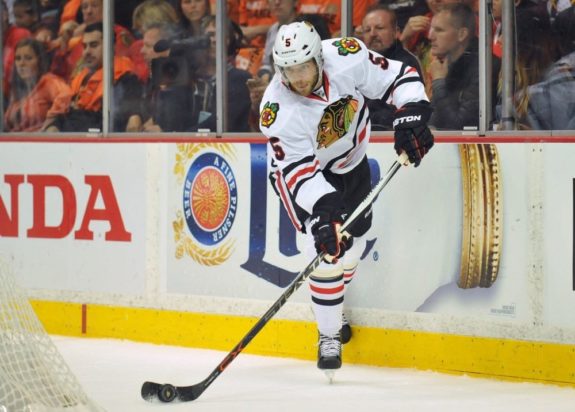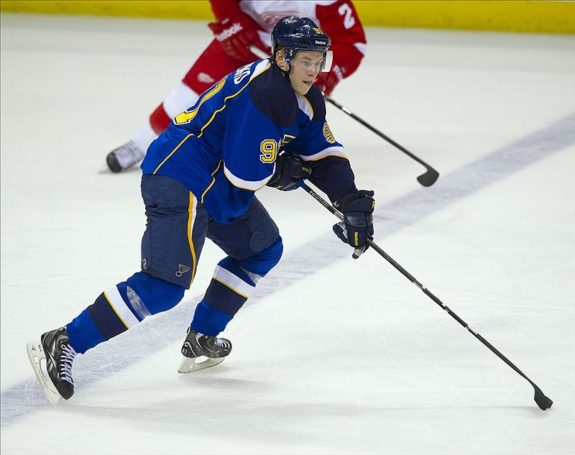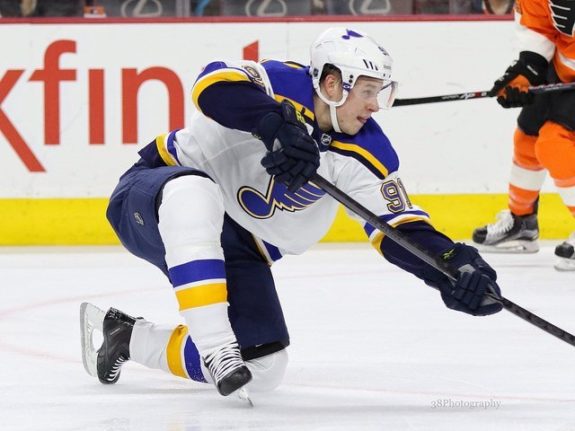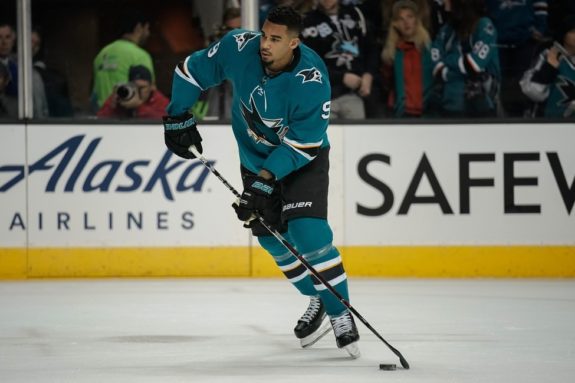In today’s NHL, a team’s navigation of the salary cap is critical to its success. Therefore, when a team signs its cornerstone players to new deals, it is paramount that they reward these players while giving themselves the flexibility to build a team around them. Such was the case when the St. Louis Blues signed Vladimir Tarasenko to a contract extension in July 2015. While the eight-year, $60-million contract was hardly a pittance at the time, the contract has matured to be one of the most valuable deals for any player in the league.
Tarasenko the Prospect
The St. Louis Blues found a gem in the middle of the first round in 2010 when they drafted Vladimir Tarasenko 16th overall. At the time, fears that the Russian game might pull him away from the NHL allowed the prolific scoring prospect to fall deeper in the first round. The Blues traded David Rundblad, whom they had drafted in the first round the year before, and was considered a potentially strong offensive defenseman, to acquire the pick, and took the player who would become their superstar.

Tarasenko and Jaden Schwartz, whom the Blues selected two picks before him, would become the centerpiece prospects of the Blues’ organization. Tarasenko would return to the KHL and perform well there, taking the team coached by his father (HC Sibir Novosibirsk) to the playoffs for the first time. In five seasons in the KHL (two of them before his draft year), Tarasenko recorded 173 points in 253 games. Despite his success, though, he remained publicly committed to the North American game, and he validated the Blues’ faith in him by making the leap to the NHL in the 2012-13 season.
Tarasenko on His Entry-Level Contract
Though his arrival in the NHL was delayed by the most recent lockout, Tarasenko stormed onto the scene once the season began. In his NHL debut, he scored his first career goal, and the team’s first goal of the season, seven minutes into the first period. He went on to record 19 points (9 goals, 11 assists) in 38 games that year. Even though he missed ten games in a shortened season, Tarasenko still finished twelfth in the voting for the Calder Trophy.

Tarasenko continued to excel in his sophomore season, scoring 21 goals and adding 22 assists in 64 games. A hand injury suffered against the Nashville Predators on March 19th jeopardized the end of his season, but he excelled through his recovery and managed to make it back in time for the playoffs. There, he recorded four goals in six games against the Chicago Blackhawks, but was unable to help the team escape the first round.
The following year was a true breakout for the young Russian. In his third North American season, Tarasenko approached a point per game pace, tallying 73 in 77 games. He finished tied for fifth in the league in goal scoring with 37, a new career, high, and was also tied for tenth overall in points. The performance earned him recognition as a second team All-Star, and even propelled him to 14th in the Hart Trophy voting. He continued his strong form in the playoffs, scoring six goals and adding an assist in only six games against the Minnesota Wild. The 2014-15 season marked the end of Tarasenko’s entry-level contract, and on the back of this strong campaign, he entered the negotiation window with all the leverage to earn top dollar from his club.
Eight Years, $60 Million for Tarasenko
The Blues entered the 2015 offseason with one major goal: re-sign their fledgling superstar. While there was some question whether the Blues would lock Tarasenko up long term, or whether they’d play it safe and go with a bridge contract, the Blues went bold, signing Tarasenko to an eight year contract valued at $60 million dollars, or a $7.5 million average annual value.
“It’s a great day in Blues history to get a player of Vladi’s caliber locked into the organization through the prime of his career…,” Blues’ GM Doug Armstrong said to NHL.com. “At such a young age, to show these skills, it really made it a priority for us to see if we could work with him to a long-term extension.”

The contract was seen as an intrepid move at the time, perhaps even a risky one. The signing put Tarasenko’s cap hit amongst the top twenty in the league, and made him the seventh-highest-paid winger in the NHL. For a player who had only had one truly excellent season at the highest level, it was a bit of a gamble. But the gamble paid off in a big way for the Blues, as Tarasenko’s play continued at the highest level.
Tarasenko on His Current Contract
Tarasenko immediately rewarded the Blues’ faith in him with a huge performance in the first year of his new deal. He scored forty goals and added 34 assists, putting him twelfth in the league’s point standings and fourth amongst goal scorers. He was selected for the all-star game, was placed on the second all-star team at the end of the season, and finished in twelfth for the Hart Trophy. He even won a fan vote to grace the cover of EA Sports’ NHL 17.
Tarasenko has scored thirty or more goals in each of the three seasons since signing his contract. All told he has scored 112 goals, adding 103 assists, playing in all but four games over those three years. In 31 playoff games during the same time, he has scored 21 points, 12 of the goals, including 15 points in 20 games during the Blues’ run to the conference final in 2015-16. Despite recording on 66 points in this past season, a relatively down year for both Tarasenko and the team, he is by all measures a genuinely elite goal-scoring winger in the NHL.

Since signing his deal, the NHL salary cap ceiling has increased by roughly ten million dollars. At the time of the contract, the deal accounted for 10.27% of the Blues’ cap space. Now, it is only 9.4% of the Blues’ cap space, and the cap ceiling is expected to continue to rise.
Looking at a list of comparable NHL contracts, few are given to players who are clearly superior to Tarasenko. Players like David Pastrnak, while on contracts with smaller AAV figures, were signed to fewer years at a younger age than was Tarasenko, meaning they will have more UFA years to earn top dollar. And one need only look at the huge money contracts given to players like Evander Kane or Ilya Kovalchuk this summer to see the kind of deals handed out to perceived scoring threats with UFA status.

Kane’s contract is a particularly good comparable for Tarasenko: though Kane is much-hyped as a goal-scorer, he has never eclipsed sixty points in a season, something Tarasenko has done with ease each of the last four years. Additionally, Kane had been thought of as a locker room troublemaker before his arrival in San Jose, something that Tarasenko, who was runner-up for the Lady Bang Trophy for sportsmanship in 2016-17, has never been accused of. In spite of this, the Sharks committed to Kane with a seven-year contract valued at seven million dollars per year, meaning he will be making just half a million dollars less per season than Tarasenko over the next five years.
Conclusion
Even after a relatively down season, Vladimir Tarasenko can be numbered among the league’s elite scorers. Over the past three seasons, Tarasenko has scored more goals than every other NHL player but Alexander Ovechkin, and he ranks fourth in game-winning goals in the same period. Tarasenko’s contract has a lower AAV than all but two players amongst the top ten goal scorers in that same period, Boston’s Brad Marchand and Dallas’ Tyler Seguin, and Seguin is currently scheduled to become a UFA following this season.
Given that company, it is impossible to see Vladimir Tarasenko’s contract as anything but an incredible value for the St. Louis Blues. Were the Russian winger to sign the same contract today, it would likely be closer to the $9.5-million AAV that his countryman Nikita Kucherov signed early last month. The Blues will control Tarasenko’s rights at this very affordable price for the next five years, which has given them the flexibility to trade for players like Ryan O’Reilly and Brayden Schenn, and extend players like Jaden Schwartz. Contracts like Tarasenko’s give teams the ability to build Stanley Cup contenders, which remains Tarasenko’s primary goal.
Whether the Blues can win the ultimate prize or not remains to be seen, but one thing is certain: with their biggest star and primary goal scorer locked up on a very team friendly deal and their owners committed to spending to the salary cap ceiling, if they cannot capture the Cup, it will not be for a lack of money.